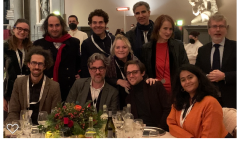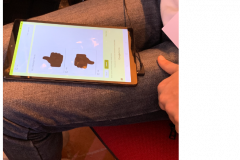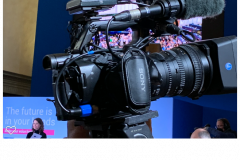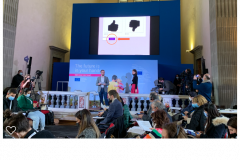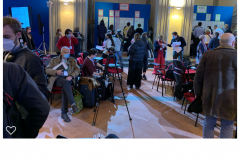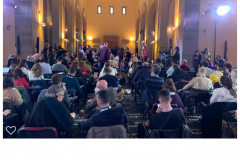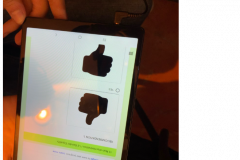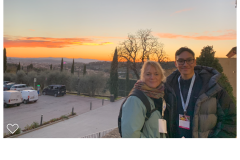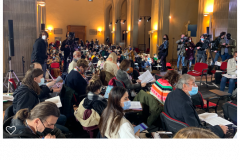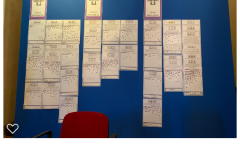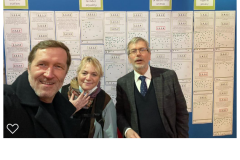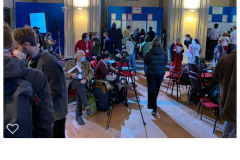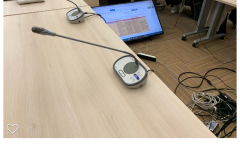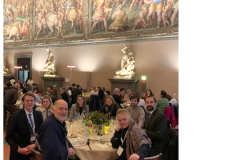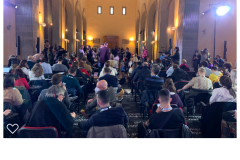Please see our Linktree : https://linktr.ee/ourdemocraticodyssey and EUI website: https://democraticodyssey.eui.eu/
In the Spring to Autumn 2023 I took part in two important reports on the future of European Democracy including participatory democracy. On one hand, changemaker Europe coordinated by Ashoka and The Good Lobby developed through an innovative methodology. The report is now available here: https://www.ashoka.org/en-us/program/changemaker-europe. On the other hand, I chaired the high level group on bolstering European Democracy, co-writing the report with Sophia Russack and Nicolai von Ondarza entitled THE RADICALITY OF SUNLIGHT (see more below and here: https://www.ceps.eu/ceps-publications/the-radicality-of-sunlight/) Check out the cool infographics! See here And the group here: https://www.ceps.eu/ceps-task-forces/ceps-swp-high-level-group-on-eu-democracy/. Both reports contain the recommendation for a standing citizens’ assembly which of course I consider a crucial building block of the renewal of European democracy.
Join the democratic Odyssey : https://democraticodyssey.eui.eu/home
Updates:
26 September 2023: On the first day of the #democraticodyssey we made democratic history by holding the very first people’s assembly at the PNYX in 2345 years. For two hundred years until 322 BC, Athenians (well, all male citizens 🙃) met here every week to decide collectively on the affairs of state. More than a hundred participants imagined with us what a peoples’ assembly for Europe could look like – inspired by the ancients, but with our 21st century tech, scale and inclusiveness. The slopes of the Acropolis witnessed an inspiring moment of democratic engagement.
Concluding words: “We are NOT closing the assembly!”
Next port flotilla ⛵️- Athens democracy forum 🗳️
Kalypso’s @nkalypso @demodyssey @athensdemocracyforum #AthensDemocracyForum #newyorktimes
For more info on the journey ahead and how to join
our flotilla, check out our brand-new website: https://democraticodyssey.eui.eu/home
Watch a video: https://www.instagram.com/reel/CxscVexsISj/?igshid=MzRlODBiNWFlZA%3D%3D
Interview with Missions Publiques:
This is a preview The “Democratic Odyssey” a transnational collective journey, open to all who would like to join the flotilla.
Its beacon: a standing European Citizens Assembly that will become a core part of the institutional landscape of the European Union, made of citizens selected by lot, serving on a rotating basis and meeting on a rotating basis around the content.
Our aim with the Odyssey is to create and experiment with a typical prototype for such an Assembly, transnational of course, but also trans-local, i.e. one that feeds itself and in turn feeds local participatory initiatives (local understood here in the rather national sense), and is neither totally top-down (initiated by an institutional authority) nor completely bottom-up (initiated by civil society alone) but follows a third way (initiated, carried and supported by a coalition of actors from all walks of life).
Our campaign will unforld throughout 2023-2024, and the Assembly proper will meet in different configurations during and after the 2024 European elections and before the State of the Union of the new Commission in 2024.
Here a couple of links with the core info as we build the new website:
In this episode of the Liberty & Responsibility podcast, Amichai Magen and Kalypso Nicolaidis discuss their mutual quests to understand the nature of democracy, what makes democracies endure, adapt, or falter, and where efforts at democratic development might take us in the 21st century.
https://1062fm.co.il/en/episode/democracys-odyssey-a-conversation-with-professor-kalypso-nicolaidis
https://www.eui.eu/news-hub?id=stg-develops-prototype-for-an-eu-wide-citizens-assembly
See also James Mackay (p46), here:
https://euroalter.com/wp-content/uploads/2023/08/EAJ_N2.pdf
And Kalypso Nicolaidis (p16) here:
https://kalypsonicolaidis.com/wp-content/uploads/2023/06/Compendium-1.pdf
And the programme as a whole:
We are launching a constituent network to support the project – i.e. brainstorming around methodology, advocacy, comms, funding – during a series of in-person events adjacent to the Athens Democracy Forum 2023 on 26-29 September this year, holding inter alia a deliberative workshop, at the Pnyx of Athens, crowdsourcing ideas with local civil society and members of the public to inform our agenda-setting process. If you are in Athens then and willing to take part or to connect to the Programme as a whole, please contact: “Gaiba, Andrea” <Andrea.Gaiba@eui.eu>
THE RADICALITY OF SUNLIGHT
See the full report here: https://www.ceps.eu/ceps-publications/the-radicality-of-sunlight/
Kalypso Nicolaidis, Nicolai von Ondarza, Sophia Russack. The Radicality of Sunlight – Five Pathways to a More Democratic Europe. This report of the high-level group on the Centre for European Political Studies (CEPS) and the Stiftung Wissentschaft Und Politik (SWP) on reinforcing European democracy was published in October and can be downloaded free of charge from the respective websites of the CEPS and the SWP.
Five Pathways to a More Democratic Europe
Published by a working group on European democracy comprising various figures such as British Labour politician and former member of the European Parliament, Richard Corbett, former French minister Harlem Desir, former European Commissioner Cecilia Malmström and serving MEPs Eva-Maria Poptcheva (Renew Europe, Spain) and Sophie in ’t Veld (Renew Europe, the Netherlands), this work puts forward a few original ideas, many of them not short on controversy, and recycles many other good ideas have never come to fruition.
The report presents five pathways for improvement, the first of which concerns transparency and probity, including:
(1) establishment of a pan-European register of lobbies via a European law on lobbying, to apply both to the European institutions and, on European matters, to lobbying activities in the member states, in order to correct a situation in which, while the work of interest representatives is gradually becoming more strictly governed at the Parliament and Council, the lobbying activities that influence the work of the Council fly under the radar as they take place in the capitals;
(2) preparatory work for good governance in the candidate countries upstream of enlargement ;
(3) improving the transparency of trilogue sessions ;
(4) greater transparency of the legislative work of the Council, making the national documents and positions accessible;
(5) in the wake of Qatargate, creating an EU ethical supervisory authority independent of the other institutions. The Commission proposed such a body, but made no provision for it to have investigative or sanctioning powers, the report laments.
The second pathway concerns crisis governance.
Over the course of the numerous crises that it has faced, the EU has shown that it is capable of reacting efficiently, but it does so by using inter-governmental procedures and article 122 TFEU to adopt acts of a legislative nature, or decide on expenditure likely, as is now the case with Next Generation EU, to affect the general budget through the servicing of debt, which is mushrooming as a result of spiralling interest rates. In particular, the report proposes that the European Parliament be given a right of co-decision whenever article 122 is invoked.
The third pathway is making the most of the European elections.
This section includes ambitions of encouraging each national party to refer to its European party during the election campaign period or for an agreement be reached on voting to take place on the same day, as well as the introduction of trans-national lists, a move that remains controversial, even within the group itself.
As regards the procedure to appoint the President of the Commission, the members of the group seem to have encountered difficulties in agreeing on consensual wording. Even so, the report suggests that the Parliament and European Council agree on the procedure before the next elections so as to reach an inter-institutional agreement either to confirm the Spitzenkanditaten system, which they would like see renamed “lead candidate” or “party candidate”, considering that most Europeans would struggle to understand the German term (whereas everybody is supposed to speak English!), or introduce an electoral college made up of the same number of representatives of the European Council and European Parliament (27 from each) to elect the President.
This is accompanied by the idea that in the event of a trans-national list, it should in all cases conducted by the party candidates. The authors of the report optimistically believe that there is time to reach an agreement before the elections of June next year.
The fourth pathway concerns the relationship between the national parliaments and Europe. This includes:
(1) incentives for the national parliaments to carry out exchanges on best practice in parliamentary controls on their governments’ activities at European level;
(2) the introduction of a mechanism allowing the national parliaments to present proposals legislative initiatives directly to the Commission;
(3) setting up a regular working session between the national parliaments and the European Parliament, either in Brussels or in the country holding the six-month Presidency of the Council.
Finally, the fifth pathway is the inevitable “participative democracy”, with such suggestions as:
(1) the launch of a major European debate to encourage the national authorities to agree to the introduction of lessons on democracy and the decision-making process in primary schools;
(2) the creation of a “permanent citizens’ assembly”, although it is not clear what it will actually be as it would have only a consultative role and there are already many actors that are more expensive than effective on this register, in particular the Committee of the Regions and the Economic and Social Committee;
(3) the introduction of a “preferendum” at EU level, a kind of multiple-choice referendum so as to convince anyone with misgivings of its non-plebiscitary nature. (OJ)
Check out the STG Initiative on Transnational Democracy at the School of Transnational Governance at EUI which I chair. Do also check out on the website on what we do at EUI on the Conference on the Future of Europe, or COFE. As part of the programme I co-convene the EUI democracy forum with Alberto Alemanno and Niccolo Milanese. Check out our transnational democracy blog: https://blogs.eui.eu/transnational-democracy/
Read our call for the creation of a permanent citizens’ assembly here. Read our 10 principles for the holding of the CoFoE. Check our Citizens Take over Europe website. You may be interested to follow our new EUI democracy blog.
Our transnational democracy forum has published a new set of resources for the COFE, including a series of ‘difficult questions‘ for deliberation updated regularly.
Recent Articles & Other Publications:
July 2022:
- The future of Europe via its history and mythology (YouTube video), House of European History
- Why CoFoE should become a permanent exercise into the EU legislative process Interview with EURACTIV with Kalypso Nicolaïdis by Eleonora Vasques
May 2022:
February 2022:
- Open Letter to Conference Chairs: a successful Conference needs an accountable Conference Plenary!
- L’Europe Puissance Citoyenne (w/ Alberto Alemanno) in Le Groupe d’études géopolitiques
January 2022:
- Citizen Power Europe: The Making of a European Citizens’ Assembly (w/ Alberto Alemanno), published in RED (Revue Européenne du Droit), Issue 3, January 2022, published by Groupe d’études géopolitiques. Available also at SSRN: https://ssrn.com/abstract=4000490
December 2022:
- Unprecedented democratic exercise at the EUI concludes
- Re-immerse yourself in Conference on the Future of Europe Citizens’ Panel hosted at the EUI last weekend – watch the video featuring our Prof Kalypso Nicolaidis and Research Fellow Costanza Hermanin.
- Democracy Forum sets the stage for European Citizens’ Panel in Florence.
- What’s in an Experiment? Participatory Democracy Comes to Town (w/ Jamie Mackay) in la Repubblica. (Italian version: Il valore di un esperimento. La democrazia partecipativa arriva a Firenze).
July 2021:
- Who represents the EU internationally? ‘Sofagate’ reignited the issue and the Conference on the Future of Europe should aim to sort it (w/ Paul Magnette) in Social Europe, 1st July 2021
March 2021:
- 10 years since the adoption of the first ECI regulation: cause for celebration or concern? (w/ Petar Markovic)
- TRIBUNE. “Pour une Assemblée citoyenne européenne” in Le Journal du Dimanche.
February 2020:
- The Conference on the Future of Europe: an Open Letter in Verfassungsblog, 1st Feburary 2020
September 2019:
- A European pivot from space to time in Social Europe, 11th September 2019
EU citizens discuss future of Europe in Florence
#NotWithoutUs | Transparency and citizen participation in the Conference on the Future of Europe!
Citizens Take Over Europe demands transparency and citizen participation in the planning of the Conference on the Future of Europe – Citizens Take Over Europe welcomes President Von der Leyen’s due reference to the Conference on the Future of Europe in her State of the Union address, but calls for greater transparency and citizen participation in the planning of the Conference.
The Conference on the Future of Europe was initially announced by Von der Leyen in advance of her appointment as Commission President as part of a ‘new push for European democracy’. However, in order to be effective, the Conference needs to involve citizens from the very beginning. The interinstitutional negotiations around the Conference are shrouded in secrecy, missing out on the expertise and experience of civil society practitioners in running participative processes, and not including citizens in setting the agenda or format of the Conference.
Including health competences in the agenda of the Conference is welcome, as is the perspective of treaty change this suggests, but the agenda must be broader and co-created with citizens from diverse backgrounds and experiences to reflect their priorities and build trust in a process which is about our common future.
The transnational civil society coalition Citizens Take Over Europe has laid out 10 principles for a citizens-centred Conference on the Future of Europe. NotWithoutUs #SOTEU2020 #CoFoE
UPDATE: OUR PETITION IS ADMISSIBLE and in the Hands of AFCO
Petition No 1070/2020 by Daniela Vancic (Serbian), on behalf of Democracy International e.V., on a plea for transparent and participatory citizens-centred Conference on the Future of Europe
The petitioner highlights the significance of the Conference on the Future of Europe for the European project but considers that citizens are being left out of this important discussion, as they are not involved in the negotiations and discussions in a structured way. The petitioner calls on the European institutions to: (1) organise a public consultation on how to design and organise the Conference as soon as the joint declaration is published, (2) ensure that citizens will be involved in setting the agenda of the Conference (3) facilitate the establishment of an independent EU Civil Society Forum to monitor the Conference and the follow-up process, (4) establish a special European Parliament Working Group on the Conference on the Future of Europe that engages in dialogue with citizens and the EU Civil Society Forum regularly throughout the duration of the Conference and (6) ensure that the joint declaration contains a clear follow-up mechanism and commitment in order to guarantee that citizens’ inputs are adequately and promptly followed up, and that a process of treaty change is launched, if so recommended by the Conference.
Recommendations
– Declare admissible;
– ask the Commission for information;
– send to the AFCO Committee for information;
– assure the petitioner that Parliament wants citizens of all backgrounds, civil society representatives and stakeholders at European, national, regional and local level to be involved in setting the EU’s priorities in line with citizens’ concerns in a bottom-up, transparent, inclusive, participatory and well-balanced approach. To that effect, in a resolution adopted on 18 June, it has urged the Council to “promptly come forward with a position on the format and organisation of the Conference” for citizens’ voices to be heard
https://www.europarl.europa.eu/doceo/document/TA-9-2020-0153_EN.html;
– send the petitioner the EP research briefing: Conference on the future of Europe
https://www.europarl.europa.eu/RegData/etudes/ATAG/2020/651959/EPRS_ATA(2020)651959_EN.pdf.
UPDATE: The CTOE consultation is now online: https://citizenstakeover.eu/news/your-voice-on-the-future-of-europe/2021/
On 25 June, the Brussels-based think tank Bruegel, published a one-hour podcast on the Conference on the Future of Europe with MEP Gabriele Bischoff, John Erik Fossum, Professor, ARENA Centre for European Studies, University of Oslo, and Kalypso Nicolaïdis, Professor of International Relations, University of Oxford. The debate touched upon issues of the Conference’s institutional design, citizens’ participation and the meaning of the process for the EU’s legitimacy.
The European Union is about to embark on a new ambitious Conference on the Future of Europe. The projected process follows previous exercises I have been involved in (the EU Commissions consultations on the White Paper 2000; the Convention drafting a Constitutional treaty 2001-03; the Wise Man group 2008-10).
Along with many friends and colleagues involved in debates on European democracy, we fear that due to its top-down approach, it is set to defy its own purpose: to be “a bottom-up exercise where European citizens are listened to and their voices contribute to the debates on the future of Europe”.
Alberto Alemanno, Niccolo Milanese, and myself drafted an open letter addressed to the President of the European Commission, President of the Council of the European Union and President of the European Parliament as they met on Jan 31 at the Jean Monnet House in Bazoches, France, to discuss Europe’s political challenges. It has already been signed by 100 academics.
In English: https://euroalter.com/2020/for-a-conference-on-a-future-of-europe-open-to-civil-societyhttps://voxeurop.eu/en/2020/conference-future-europe-5124320
Open for signatures: https://docs.google.com/forms/d/e/1FAIpQLSfCMgsEn6VtgFITrjFnAMAHAUFTsMve463O8j_B_MkW3ymZ0A/viewform
Commission Paper https://ec.europa.eu/info/sites/info/files/communication-conference-future-of-europe-january-2020_en.pdf
Charter 2020
In the run-up to the European elections of May 2019, I participated in an exciting collective endeavor to articulate the European project around a Charta 2020 which encourages Europeans to think about the precious value of public goods… Charter 2020
I am taking part in two EU research networks on differentiated integration, that is the key to the future of Europe – check out great work already:
https://www.eu3d.uio.no/
https://euidea.eu/
I am supporting the European Citizens Initiative “Voters Without Borders” which is all about transnational Europe.
